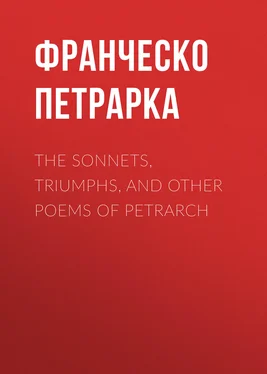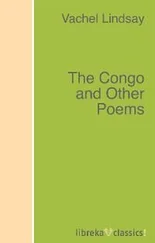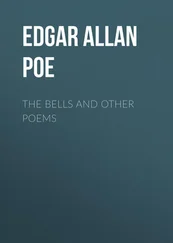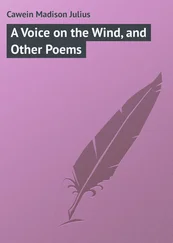Франческо Петрарка - The Sonnets, Triumphs, and Other Poems of Petrarch
Здесь есть возможность читать онлайн «Франческо Петрарка - The Sonnets, Triumphs, and Other Poems of Petrarch» — ознакомительный отрывок электронной книги совершенно бесплатно, а после прочтения отрывка купить полную версию. В некоторых случаях можно слушать аудио, скачать через торрент в формате fb2 и присутствует краткое содержание. Жанр: foreign_poetry, Поэзия, foreign_antique, foreign_prose, на английском языке. Описание произведения, (предисловие) а так же отзывы посетителей доступны на портале библиотеки ЛибКат.
- Название:The Sonnets, Triumphs, and Other Poems of Petrarch
- Автор:
- Жанр:
- Год:неизвестен
- ISBN:нет данных
- Рейтинг книги:5 / 5. Голосов: 1
-
Избранное:Добавить в избранное
- Отзывы:
-
Ваша оценка:
- 100
- 1
- 2
- 3
- 4
- 5
The Sonnets, Triumphs, and Other Poems of Petrarch: краткое содержание, описание и аннотация
Предлагаем к чтению аннотацию, описание, краткое содержание или предисловие (зависит от того, что написал сам автор книги «The Sonnets, Triumphs, and Other Poems of Petrarch»). Если вы не нашли необходимую информацию о книге — напишите в комментариях, мы постараемся отыскать её.
The Sonnets, Triumphs, and Other Poems of Petrarch — читать онлайн ознакомительный отрывок
Ниже представлен текст книги, разбитый по страницам. Система сохранения места последней прочитанной страницы, позволяет с удобством читать онлайн бесплатно книгу «The Sonnets, Triumphs, and Other Poems of Petrarch», без необходимости каждый раз заново искать на чём Вы остановились. Поставьте закладку, и сможете в любой момент перейти на страницу, на которой закончили чтение.
Интервал:
Закладка:
The number of days fixed for the Roman pilgrims to visit the churches was thirty; and fifteen or ten for the Italians and other strangers, according to the distance of the places from which they came.
Petrarch says that it is inconceivable how the city of Rome, whose adjacent fields were untilled, and whose vineyards had been frozen the year before, could for twelve months support such a confluence of people. He extols the hospitality of the citizens, and the abundance of food which prevailed; but Villani and others give us more disagreeable accounts—namely, that the Roman citizens became hotel-keepers, and charged exorbitantly for lodgings, and for whatever they sold. Numbers of pilgrims were thus necessitated to live poorly; and this, added to their fatigue and the heats of summer, produced a great mortality.
As soon as Petrarch, relieved by surgical skill from the wound in his leg, was allowed to go out, he visited all the churches.
After having performed his duties at the jubilee, Petrarch returned to Padua, taking the road by Arezzo, the town which had the honour of his birth. Leonardo Aretino says that his fellow-[Pg lxxviii]townsmen crowded around him with delight, and received him with such honours as could have been paid only to a king.
In the same month of December, 1350, he discovered a treasure which made him happier than a king. Perhaps a royal head might not have equally valued it. It was a copy of Quintilian's work "De Institutione Oratoria," which, till then, had escaped all his researches. On the very day of the discovery he wrote a letter to Quintilian, according to his fantastic custom of epistolizing the ancients. Some days afterwards, he left Arezzo to pursue his journey. The principal persons of the town took leave of him publicly at his departure, after pointing out to him the house in which he was born. "It was a small house," says Petrarch, "befitting an exile, as my father was." They told him that the proprietors would have made some alterations in it; but the town had interposed and prevented them, determined that the place should remain the same as when it was first consecrated by his birth. The poet related what had been mentioned to a young man who wrote to him expressly to ask whether Arezzo could really boast of being his birthplace. Petrarch added, that Arezzo had done more for him as a stranger than Florence as a citizen. In truth, his family was of Florence; and it was only by accident that he was born at Arezzo. He then went to Florence, where he made but a short stay. There he found his friends still alarmed about the accident which had befallen him in his journey to Rome, the news of which he had communicated to Boccaccio.
Petrarch went on to Padua. On approaching it, he perceived a universal mourning. He soon learned the foul catastrophe which had deprived the city of one of its best masters.
Jacopo di Carrara had received into his house his cousin Guglielmo. Though the latter was known to be an evil-disposed person, he was treated with kindness by Jacopo, and ate at his table. On the 21st of December, whilst Jacopo was sitting at supper, in the midst of his friends, his people and his guards, the monster Guglielmo plunged a dagger into his breast with such celerity, that even those who were nearest could not ward off the blow. Horror-struck, they lifted him up, whilst others put the assassin to instant death.
The fate of Jacopo Carrara gave Petrarch a dislike for Padua, and his recollections of Vaucluse bent his unsettled mind to return to its solitude; but he tarried at Padua during the winter. Here he spent a great deal of his time with Ildebrando Conti, bishop of that city, a man of rank and merit. One day, as he was dining at the Bishop's palace, two Carthusian monks were announced: they were well received by the Bishop, as he was partial to their order. He asked them what brought them to Padua. "We are going," they said, "to Treviso, by the direction of our general, there to remain and establish a monastery." Ildebrando asked if they knew Father Gherardo, Petrarch's brother. The two monks, who did not know the poet, gave the most pleasing accounts of his brother.
The plague, they said, having got into the convent of Montrieux, the prior, a pious but timorous man, told his monks that flight was the only course which they could take: Gherardo answered with courage, "Go whither you please! As for myself I will remain in the situation in which Heaven has placed me." The prior fled to his own country, where death soon overtook him. Gherardo remained in the convent, where the plague spared him, and left him alone, after having destroyed, within a few days, thirty-four of the brethren who had continued with him. He paid them every service, received their last sighs, and buried them when death had taken off those to whom that office belonged. With only a dog left for his companion, Gherardo watched at night to guard the house, and took his repose by day. When the summer was over, he went to a neighbouring monastery of the Carthusians, who enabled him to restore his convent.
While the Carthusians were making this honourable mention of Father Gherardo, the prelate cast his eyes from time to time upon Petrarch. "I know not," says the poet, "whether my eyes were filled with tears, but my heart was tenderly touched." The Carthusians, at last discovering who Petrarch was, saluted him with congratulations. Petrarch gives an account of this interview in a letter to his brother himself.
Padua was too near to Venice for Petrarch not to visit now and then that city which he called the wonder of the world. He there made acquaintance with Andrea Dandolo, who was made Doge in 1343, though he was only thirty-six years of age, an extraordinary elevation for so young a man; but he possessed extraordinary merit. His mind was cultivated; he loved literature, and easily became, as far as mutual demonstrations went, the personal friend of Petrarch; though the Doge, as we shall see, excluded this personal friendship from all influence on his political conduct.
The commerce of the Venetians made great progress under the Dogeship of Andrea Dandolo. It was then that they began to trade with Egypt and Syria, whence they brought silk, pearls, the spices, and other products of the East. This prosperity excited the jealousy of the Genoese, as it interfered with a commerce which they had hitherto monopolized. When the Venetians had been chased from Constantinople by the Emperor Michael Paleologus, they retained several fortresses in the Black Sea, which enabled them to continue their trade with the Tartars in that sea, and to frequent the fair of Tana. The Genoese, who were masters of Pera, a suburb of Constantinople, would willingly have joined the Greeks in expelling their Italian rivals altogether from the Black Sea; and privateering hostilities actually commenced between the two republics, which, in 1350, extended to the serious aspect of a national war.
The winter of that year was passed on both sides in preparations. The Venetians sent ambassadors to the King of Arragon, who had some differences with the Genoese about the Island of Sardinia, and to the Emperor of Constantinople, who saw with any sensation in the world but delight the flag of Genoa flying over the walls of Pera. A league between those three powers was quickly concluded, and their grand, common object was to destroy the city of Genoa.
It was impossible that these great movements of Venice should be unknown at Padua. Petrarch, ever zealous for the common good of Italy, saw with pain the kindling of a war which could not but be fatal to her, and thought it his duty to open his heart to the Doge of Venice, who had shown him so much friendship. He addressed to him, therefore, the following letter from Padua, on the 14th of March, 1351:—
"My love for my country forces me to break silence; the goodness of your character encourages me. Can I hold my peace whilst I hear the symptoms of a coming storm that menaces my beloved country? Two puissant people are flying to arms; two flourishing cities are agitated by the approach of war. These cities are placed by nature like the two eyes of Italy; the one in the south and west, and the other in the east and north, to dominate over the two seas that surround them; so that, even after the destruction of the Roman empire, this beautiful country was still regarded as the queen of the world. I know that proud nations denied her the empire of the land, but who dared ever to dispute with her the empire of the sea?
Читать дальшеИнтервал:
Закладка:
Похожие книги на «The Sonnets, Triumphs, and Other Poems of Petrarch»
Представляем Вашему вниманию похожие книги на «The Sonnets, Triumphs, and Other Poems of Petrarch» списком для выбора. Мы отобрали схожую по названию и смыслу литературу в надежде предоставить читателям больше вариантов отыскать новые, интересные, ещё непрочитанные произведения.
Обсуждение, отзывы о книге «The Sonnets, Triumphs, and Other Poems of Petrarch» и просто собственные мнения читателей. Оставьте ваши комментарии, напишите, что Вы думаете о произведении, его смысле или главных героях. Укажите что конкретно понравилось, а что нет, и почему Вы так считаете.












